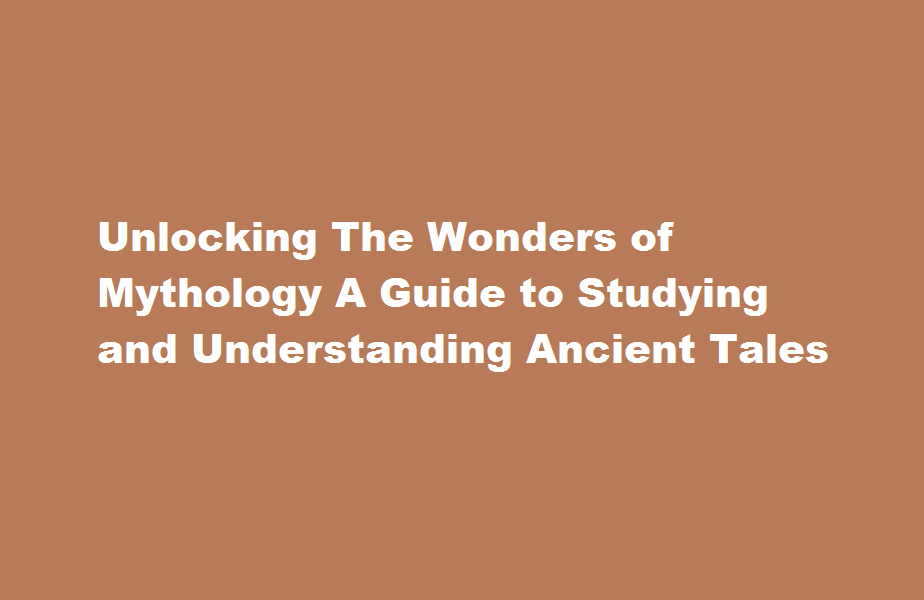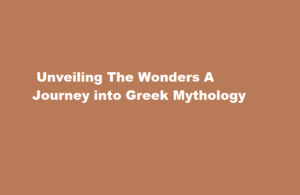Unlocking The Wonders of Mythology A Guide to Studying and Understanding Ancient Tales
3 min read
Introduction
Mythology, the rich tapestry of ancient tales and legends, provides invaluable insights into the beliefs, values, and cultural heritage of civilizations throughout history. Studying mythology not only immerses us in captivating narratives but also deepens our understanding of human nature and the human experience. In this article, we will explore effective strategies and resources that can help you embark on a fascinating journey into the realms of mythology.
Embrace the Fundamentals
To lay a solid foundation for studying mythology, it is crucial to grasp the fundamental concepts and themes prevalent in various mythologies. Familiarise yourself with key gods, goddesses, heroes, and mythical creatures, and learn about the cosmologies and creation myths of different cultures. By understanding these fundamental elements, you’ll be able to recognize recurrent motifs and symbolism across different mythological traditions.
Diversify Your Mythological Horizons
Mythology is a vast and diverse field, with a multitude of cultures and civilizations having their own unique mythological systems. Expand your knowledge by exploring mythologies from different regions such as Greek, Roman, Norse, Egyptian, Hindu, and Native American. Comparing and contrasting these diverse mythologies can provide a deeper understanding of the universal themes and archetypes that connect humanity across time and space.
Read Primary Sources and Interpretations
To delve into the heart of mythology, turn to the primary sources themselves. Read translations of ancient texts, such as the “Iliad,” the “Epic of Gilgamesh,” or the “Ramayana,” to experience the myths in their original contexts. Additionally, explore renowned mythological works by scholars and experts who provide interpretations and analysis of these ancient stories. Some recommended authors include Joseph Campbell, Carl Jung, and Mircea Eliade, whose works offer valuable insights into the psychological, symbolic, and sociological aspects of mythology.
Engage with Visual and Performing Arts
Mythology has been a rich source of inspiration for artists throughout history. Explore paintings, sculptures, and other visual representations that depict mythological themes. Analyse how artists have interpreted and conveyed the essence of mythological narratives through their craft. Additionally, watch plays, ballets, or films based on mythological tales, as these mediums bring the stories to life in unique and captivating ways.
Connect with Mythology Communities
Engaging with others who share your passion for mythology can enhance your learning experience. Join online forums, discussion groups, or social media communities dedicated to mythology. Participate in conversations, share insights, and ask questions to gain new perspectives and deepen your understanding. Connecting with like-minded individuals can also lead to discovering new resources, books, or research articles that you may not have come across otherwise.
Frequently Asked Questions
How do I start studying mythology?
Fortunately, there are many free resources available to learn about mythology, especially Greek mythology. One of the best resources is GreekMythology.com, which is an app, YouTube channel, and website. The website has the most information with a clear outline of each god and goddess as well as the famous myths.
Why is mythology a difficult subject to study?
Mythology is a complicated subject: it touches on literature, history, anthropology, sociology, psychology, religion, and even science. How have you ever tried to make a Slurpee mixing all of the flavours together? Mythology is exactly like that, but it’s a Slurpee of knowledge, with no brain freeze and a lot to learn.
Conclusion
Studying mythology is a rewarding journey that allows us to explore the timeless wisdom and collective imagination of humanity. By embracing the fundamentals, diversifying your mythological horizons, reading primary sources, engaging with visual and performing arts, and connecting with mythology communities, you can unlock the mysteries and meaning embedded within ancient tales. As you embark on this quest, remember that mythology is not only a subject of academic study but also a source of inspiration, creativity, and personal growth. Allow the myths to resonate with you, and let them weave their magic, guiding you on a path of discovery and understanding of the human experience across cultures and civilizations.
Read Also : Mastering The Art of Coding A Comprehensive Guide






